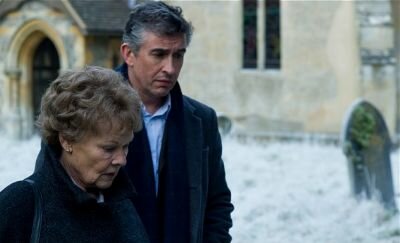
|
| |
| |
|
|
| |
 |
| |
| Released: |
2013 |
| |
|
| Genre: |
DRAMA
BIOPIC
|
| |
|
| Origin: |
UK |
| |
|
| Length: |
98 |
|
| |
|
| |
|
|
| |
|
|
Wry, thought-provoking and touching.
|
Reviewed by Chris Tookey
|
Philomena is a superb film with an Oscar-quality central performance by Dame Judi Dench (pictured left). Even if, as I suspect, she loses at the Academy Awards to Cate Blanchett for Blue Jasmine, that will be no reflection on Dench’s excellence. Here, she is as transparent, delicate and affecting as she has ever been.
Philomena is a fine example of the kind of movie critics routinely disparage as a “crowd-pleaser”. In other words, it will involve your emotions and make you cry, more than once - which is most people’s idea of a terrific time in the cinema.
Stephen Frears, noticeably less grumpy than he used to be and still on top form at 72, is always great with actors, and this is his finest film since he directed Helen Mirren in The Queen. He’s well served by Steve Coogan (pictured right) and Jeff Pope’s clever screenplay, based on Martin Sixsmith’s non-fiction book, The Lost Child of Philomena Lee.
There’s nothing stylistically innovative about the film, and that may earn it the familiar critical jibe of being “middlebrow”. But the script has a rare, distinctly upmarket ability to combine laughter with tears.
And it has an even more unusual quality: right up until the end, it’s carefully ambiguous about which of the two leading characters is the film’s moral centre.
As the picture is called Philomena, you might expect it to be from her point of view. Dench splendidly and unpatronisingly captures the essence of a simple Catholic soul, eager to see the good in people and gracious even to the nuns who separated her from her illegitimate son, Anthony, when he was only three years old.
The central narrative is about her quest for that missing son, which leads to unexpected revelations that I would not dream of divulging.
You might expect such a story to be anti-Catholic. One of the film’s strengths is that in its title character, it offers a complex, nuanced vision of religion. Philomena’s belief in God enables her to survive the cruel depredations of people claiming to act in his name. Dench’s own faith (she’s a Quaker) helps her to portray such a character with impressive depth of understanding.
The other storyline, skilfully interwoven with Philomena’s quest, is the humanisation of Martin Sixsmith, the BBC journalist turned Blairite spin doctor. He is portrayed with more than a hint of malice by Steve Coogan, whose lack of affection for journalists has been exhaustively documented, not least by himself.
When Sixsmith is first approached by Philomena’s daughter (the consistently admirable Anna Maxwell Martin) he grandly dismisses the tale of her mother’s 50-year quest for her lost son as “a human interest story,” adding that these kind of stories are written both for and about the “weak-minded, vulnerable and ignorant”.
But when he can’t interest anyone in publishing his projected heavyweight tome about Russian history, he goes back to the story and pitches it to a magazine editor with an unashamedly populist agenda. The script wittily makes the point that in the morally topsy-turvy world of journalism, bad things are “good”, i.e. marketable. For Philomena, good and evil are absolutes. But for Sixsmith and his journalistic ilk, they are commodities.
A legitimate criticism of a movie that’s strong on irony is that it’s unwilling to examine its own hypocrisies. The screenplay mocks Sixsmith for packaging human tragedy as entertainment, while simultaneously doing precisely the same itself.
Despite the film’s eagerness to portray Sixsmith as exploitative, it is he who turns out to be its true moral centre. With all his faults, his reactions to the outrages inflicted by the Catholic church are easier to empathise with than Philomena’s stoicism. His shock is our shock.
Frears’ film is every bit as indignant about Roman Catholic injustices as Peter Mullan’s 2002 melodrama The Magdalene Sisters, but its willingness to see them from multiple points of view makes it the more sophisticated movie. It shows not only the extent of the cruelty and bigotry involved, but enables us to understand how they were allowed to go unchallenged for so long.
This is a fine film, well up there with Frears’ best, and the remarkable story it has to tell is certainly worth 98 minutes of your time.
|
|
|
|
|
|
